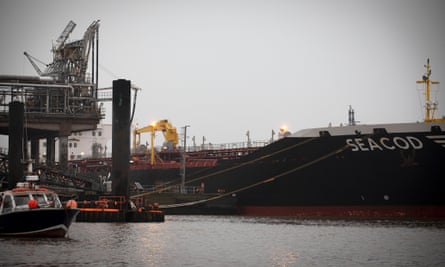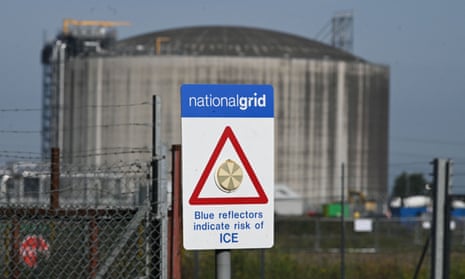Dockers who vowed not to unload a tanker of Russian gas that was due to arrive at a Thames Estuary port in the early hours of Friday morning have scored a victory, after the ship was diverted, the Guardian understands.
The Boris Vilkitskiy was on its way to the Isle of Grain with a consignment of liquefied natural gas (LNG) for Centrica, the owner of British Gas, owing to an apparent loophole on Russian-associated ships imposed by the Department for Transport.
But after dockers represented by the trade union Unison warned they would rebel against any instruction to help bring the gas onshore, the ship will no longer dock at the Kent facility.
Tankers carrying oil and gas are still arriving at or heading towards ports around the country, including Foyle Port in Derry and Liverpool. But National Grid, which operates the Isle of Grain LNG terminal, confirmed it was now no longer expecting any deliveries of Russian gas.
“This will come as a relief to the Grain terminal workers,” said Matt Lay, Unison’s national officer for energy. “But while it looks like the union’s intervention has been successful in seeing these ships turned away, a more fundamental problem remains.”
He pointed out that ships carrying Russian oil and gas are still able to dock at British ports because the DfT’s ban does not cover the origin of vessels’ cargo, despite the transport secretary, Grant Shapps, saying earlier this week that the measure extended to “all ships with any Russian connection whatsoever”.
“The government must act immediately to close this loophole and stop Russian goods continuing to arrive in the UK under the cover of another country,” said Lay.
While the Boris Vilkitskiy will no longer dock at Isle of Grain, a tanker called the Pluto was moored at Foyle Port on Thursday, while the Seacod, bringing oil from the Primorsk terminal that accounts for 30% of Russian oil exports, was anchored off Liverpool.

The UK could spend an average of more than £6m a day on Russian gas this year, according to analysts at the Energy and Climate Intelligence Unit (ECIU).
They estimated the spend would reach £2.3bn this year at a wholesale gas price of 200p/therm, if imports continue at the rate seen in 2021.
“Although not at the same level of some other European countries, the UK has been spending billions of pounds on Russian gas that could now be being used to fund Putin’s war in Ukraine,” said Dr Simon Cran-McGreehin, the unit’s head of analysis.
“This is another reason why the UK needs to break its dependency on gas – and insulating our homes, deploying electric heat pumps and shifting from gas power stations to renewables is the way to do it.”
The analysis came as the International Energy Agency released a 10-point plan for reducing the European Union’s reliance on supplies controlled by the Kremlin.
The EU needs to act quickly to reduce its reliance on Russian natural gas@IEA’s 10-Point Plan shows how the EU can cut gas imports from Russia by over a third in a year while supporting the transition to clean energy in a secure & affordable way
— Fatih Birol (@fbirol) March 3, 2022
More ➡️ https://t.co/Z6rFD9e0fw pic.twitter.com/wUK0J0eNZ6
While the UK is no longer a member of the EU, British wholesale prices are heavily dependent on the European market.
